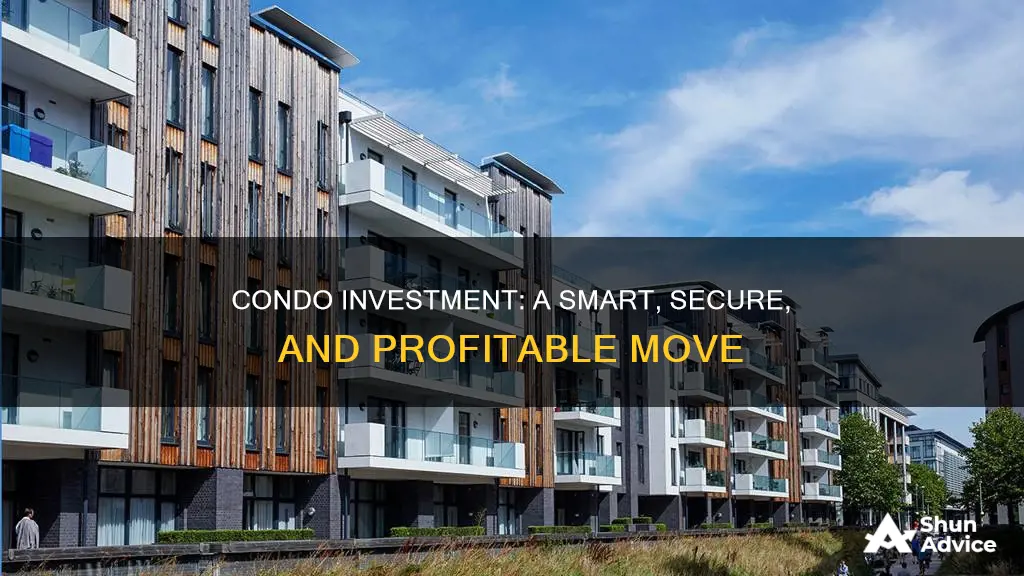
Investing in a condo can be a great option for first-time buyers, those looking for a vacation home, or those looking for a rental property. Condos are generally more affordable than single-family homes and often located in desirable locations. They also offer amenities such as gyms, pools, and communal spaces, and owners are not responsible for external maintenance and repairs. However, there are also drawbacks to investing in a condo, including high association fees and less control over certain aspects of the property due to the community's homeowners association (HOA).
| Characteristics | Values |
|---|---|
| Initial cost | Condos are priced lower than single-family homes. |
| Maintenance | Condo owners are not responsible for external maintenance and repair costs. |
| Monthly fees | Condo owners must pay monthly association fees, which cover shared expenses. |
| Amenities | Condos offer amenities such as gyms, pools, and communal spaces. |
| Appreciation | Condos appreciate in value over time. |
| Rental income | Condos can be used as rental properties, generating passive income. |
| Community | Condos foster a sense of community and social engagement. |
| Security | Condos often have robust security measures, offering a sense of safety for residents. |
What You'll Learn

Condos can be a gateway to first-time home ownership
Condos can be a great option for first-time home buyers. They are generally more affordable than single-family homes, with lower purchase prices and ongoing costs. This makes them an attractive option for those looking to build equity without requiring as large a down payment and closing costs as a traditional home.
Condos also offer a more maintenance-free lifestyle, as the homeowner's association (HOA) typically handles external maintenance and repairs, as well as landscaping and common area upkeep. This can be a significant advantage for busy professionals or those who prefer to spend their free time on activities other than home upkeep. HOA fees, while an additional expense, can be worth it for the time and cost savings on maintenance and repairs.
Condos also tend to be located in desirable areas, such as city centres and popular vacation destinations, and often include access to amenities like fitness centres, pools, and community spaces. This can enhance your quality of life and provide a sense of community and social engagement with your neighbours.
However, there are some potential drawbacks to consider. Condo owners have limited control over certain aspects of their property, as major decisions and exterior modifications are often subject to approval from the HOA. HOA rules and regulations can sometimes restrict personal preferences and lifestyle choices, and rental restrictions may impact your flexibility and income potential. Additionally, monthly HOA fees can be high and impact your overall cost of ownership, and special assessments for unexpected repairs or improvements can occur.
Overall, condos can be a great gateway to first-time home ownership, offering affordability, convenience, and a sense of community. However, it's important to carefully consider the specific condo community's rules, regulations, and financial health before making a purchase decision.
International Investing: Smart Move or Risky Bet?
You may want to see also

Condos can be a source of passive income through rental investing
Condos can be a great source of passive income through rental investing. Here are some reasons why:
Appreciation and Return on Investment
Condos tend to appreciate steadily in value over time, offering a solid return on investment. This appreciation provides a substantial return on investment in addition to consistent rental income. The rate of appreciation usually depends on factors such as location and upkeep. The better the location and maintenance, the higher the rate of appreciation.
Lower Costs and Maintenance
Condos generally cost less than single-family homes, making them more affordable for first-time homebuyers and real estate investors. They also tend to have lower maintenance requirements since the condo or homeowners association (HOA) typically handles exterior upkeep, landscaping, and common area maintenance. This frees up time and resources for condo owners, who only need to maintain the interior of their unit.
Amenities
Condos often come with a range of amenities such as gyms, pools, and communal spaces. These amenities can enhance the appeal of the property, making it easier to find renters or guests for short-term rentals. They also add value to the living experience, providing a more luxurious lifestyle compared to a single-family home.
Community Living
Condos foster a sense of community and social engagement, which can be ideal for individuals who enjoy living in close proximity to their neighbours. This sense of community can lead to shared responsibilities and a more harmonious living environment.
Rental Income
Condos can be a lucrative source of passive income through rental investing. They are often located in desirable areas, such as city centres or popular vacation destinations, making them attractive to renters or short-term guests. The ability to charge a premium for short-term rentals can further increase the cash flow of rental income.
Tax Benefits
There may be potential tax benefits associated with owning a condo. For example, mortgage interest deductions and certain home office expenses may apply. Consulting with a tax professional can help maximize these benefits and optimize the overall financial strategy.
In summary, investing in a condo can be a wise financial decision, offering the potential for steady appreciation, lower costs and maintenance, desirable amenities, and the opportunity to generate passive income through rentals. However, it is important to carefully consider the associated fees, rules, and restrictions before making any investment decisions.
Creating an Investment LLC: A Step-by-Step Guide
You may want to see also

Condos often have desirable locations
Why Investing in a Condo Makes Sense: Desirable Locations
Condos are often located in desirable areas, making them an attractive option for those seeking convenient and accessible living. Here are some reasons why condos tend to have desirable locations:
Urban Convenience
Condos are typically found in urban areas, offering residents easy access to city amenities. They are often situated within walking distance of public transportation, major roadways, shopping centres, cultural hotspots, and workplaces. This minimises commute times and promotes an urban lifestyle.
Community Amenities
Condo communities are usually designed with a range of amenities that cater to different lifestyles and interests. These may include swimming pools, fitness centres, party rooms, and even on-site security and concierge services. These amenities enhance the overall living experience and provide opportunities for social interaction and engagement within the community.
Proximity to Attractions
Condos are often strategically built in popular areas, offering easy access to local attractions and destinations. This can include proximity to beaches, ski resorts, or other tourist hotspots, making them ideal for vacation homes or short-term rentals.
Neighbourhood Vibes
When investing in a condo, it's important to consider the surrounding neighbourhood. Look for areas that align with your preferences and offer a desirable community vibe. This may include factors such as proximity to amenities, public transport, and a vibrant community feel.
Affordability
Condos tend to be more affordable than single-family homes, making them a cost-effective option for first-time homebuyers or those on a budget. This affordability extends to insurance and taxes, as condos are typically smaller in size and part of a multi-unit residence, resulting in lower property values and taxes.
Corporate Investment Management: Strategies for Business Growth
You may want to see also

Condos are low-maintenance as the condo association handles external upkeep
Condos are an excellent investment option for those seeking low-maintenance, convenient living. One of the most significant advantages of condo living is that the condo association handles external upkeep and maintenance, freeing owners from the burden of time-consuming and costly repair work.
The condo association, also known as the homeowners association (HOA), is responsible for maintaining the exterior of the building, including any necessary repairs. This means condo owners don't have to worry about tasks like roof repairs, exterior painting, or yard work. Instead, they can enjoy their free time and focus on other priorities.
The monthly HOA fees that condo owners pay contribute to a collective fund that covers these external maintenance services. While these fees add to the overall cost of owning a condo, they offer peace of mind and protection from unexpected, hefty expenses. For instance, if the roof needs to be replaced or there's a problem with the building's exterior, the HOA will take care of it without the owner having to lift a finger.
Not only does the HOA handle external maintenance, but they also typically maintain any common areas and amenities that the condo community shares. This can include swimming pools, fitness centers, party rooms, gardens, and more. These amenities enhance the quality of life for condo residents and are maintained without any additional effort or cost to the individual owners.
The HOA's role in external upkeep and maintenance is particularly appealing to those who lead busy lives or simply prefer to spend their time on activities other than home repairs and maintenance. It's also ideal for those who may not be physically able to perform certain tasks, ensuring that the exterior of their home is well-maintained without any personal strain.
Additionally, the HOA's involvement in external upkeep can help maintain the property's curb appeal and overall value. Regular maintenance keeps the building and its surroundings looking attractive, which can be beneficial when it comes time to sell or rent out the condo.
While the condo association handles the external upkeep, it's important to note that individual condo owners are typically responsible for maintaining the interior of their units. This includes any repairs or maintenance specific to their unit, such as appliance repairs or interior painting. However, the burden of external maintenance, which is often more costly and time-consuming, is lifted from the shoulders of condo owners.
Overall, the condo association's role in handling external upkeep and maintenance is a significant advantage for condo owners, offering convenience, peace of mind, and enhanced curb appeal.
BTC Investment Strategies: Maximizing Your Profits
You may want to see also

Condos are cheaper than single-family homes
Why Investing in a Condo Makes Sense: Condos are Cheaper than Single-Family Homes
Condos are generally more affordable than single-family homes, making them an attractive option for those looking to get on the property ladder or downsize. In July 2023, the average listing price for a condo was about 15% less than the average price for a single-family home. This price difference can be even more pronounced in costly urban areas.
Lower Upfront Costs
Condos generally come with lower upfront costs than single-family homes. You only buy the interior space of a condo, and exterior maintenance and repairs are typically covered by the homeowners' association or condo association fees. These fees can add $200 to $500 per month to your housing costs, but they are predictable expenses that can prevent unexpected large bills.
Lower Ongoing Costs
Condos are often more energy-efficient, with shared walls and smaller spaces to heat and cool, leading to lower utility bills. Condo association fees may also cover utilities like water, and services like trash pickup, which would be separate bills for a single-family home. Condo insurance costs are also typically lower than for single-family homes, as you are mainly insuring your possessions.
Lower Taxes
Condos usually have lower property taxes than single-family homes, as they are generally smaller and have a lower property value assessment.
Cheaper Amenities
Condos often provide access to amenities like swimming pools, gyms, and community spaces, which are shared among residents and covered by the association fees. These amenities can enhance your quality of life without the need for costly memberships or maintenance.
More Affordable Entry to Homeownership
With their lower prices and monthly fees, condos are a more affordable way to enter the housing market. They are a good option for those who want to build equity without having to make a large down payment or pay high closing costs.
Downsides to Consider
While condos are generally cheaper than single-family homes, there are some potential downsides to consider. Condo association fees can be high, affecting your return on investment over time. Condos also tend to appreciate more slowly than single-family homes and may be subject to more restrictions on rentals and renovations. Additionally, condos offer less space and privacy than single-family homes, with shared walls and common areas.
Investors: Strategies for Smart Investment Decisions
You may want to see also
Frequently asked questions
Condos are generally more affordable than single-family homes. They also tend to be in desirable locations and offer amenities like gyms and pools. Condo owners are not responsible for external maintenance and repairs, which are covered by the homeowners association (HOA) fees.
Can be. Condos in desirable locations can be rented out for a premium, providing a steady return on investment. The money made from renting the condo may cover mortgage costs and HOA fees.
Condos generally appreciate in value over time, although they may do so at a slower rate than single-family homes. Factors such as location, market demand, and property maintenance can influence the rate of appreciation.
Condo owners may be able to take advantage of tax deductions such as mortgage interest deductions and certain home office expense deductions. Consulting a tax professional can help optimize your financial strategy.
Monthly HOA fees can be high and impact the overall cost of ownership. Condo owners have limited control over certain aspects of their property, as major decisions are subject to approval from the HOA. Resale value may also be impacted by market saturation or issues with the HOA.







